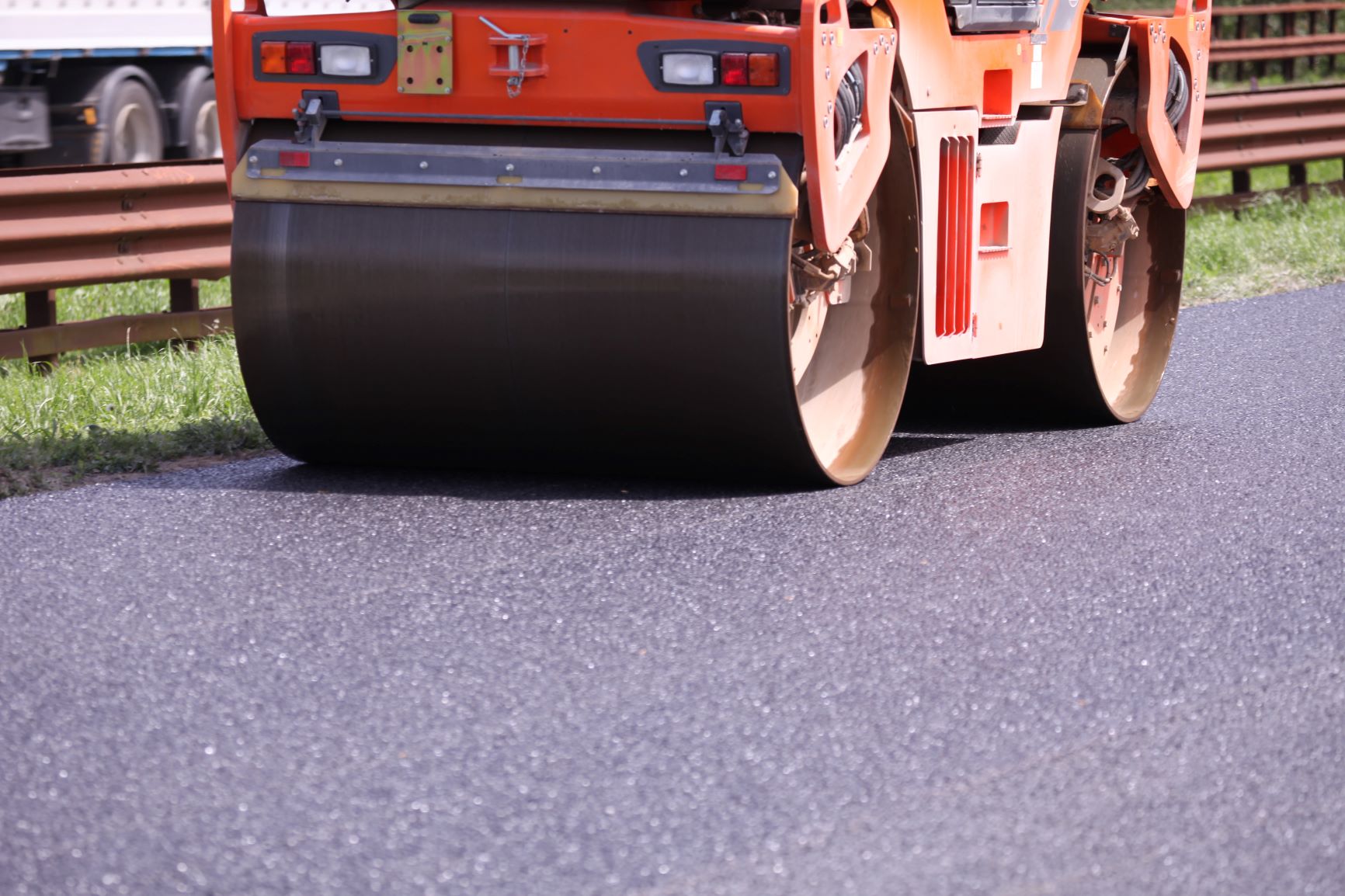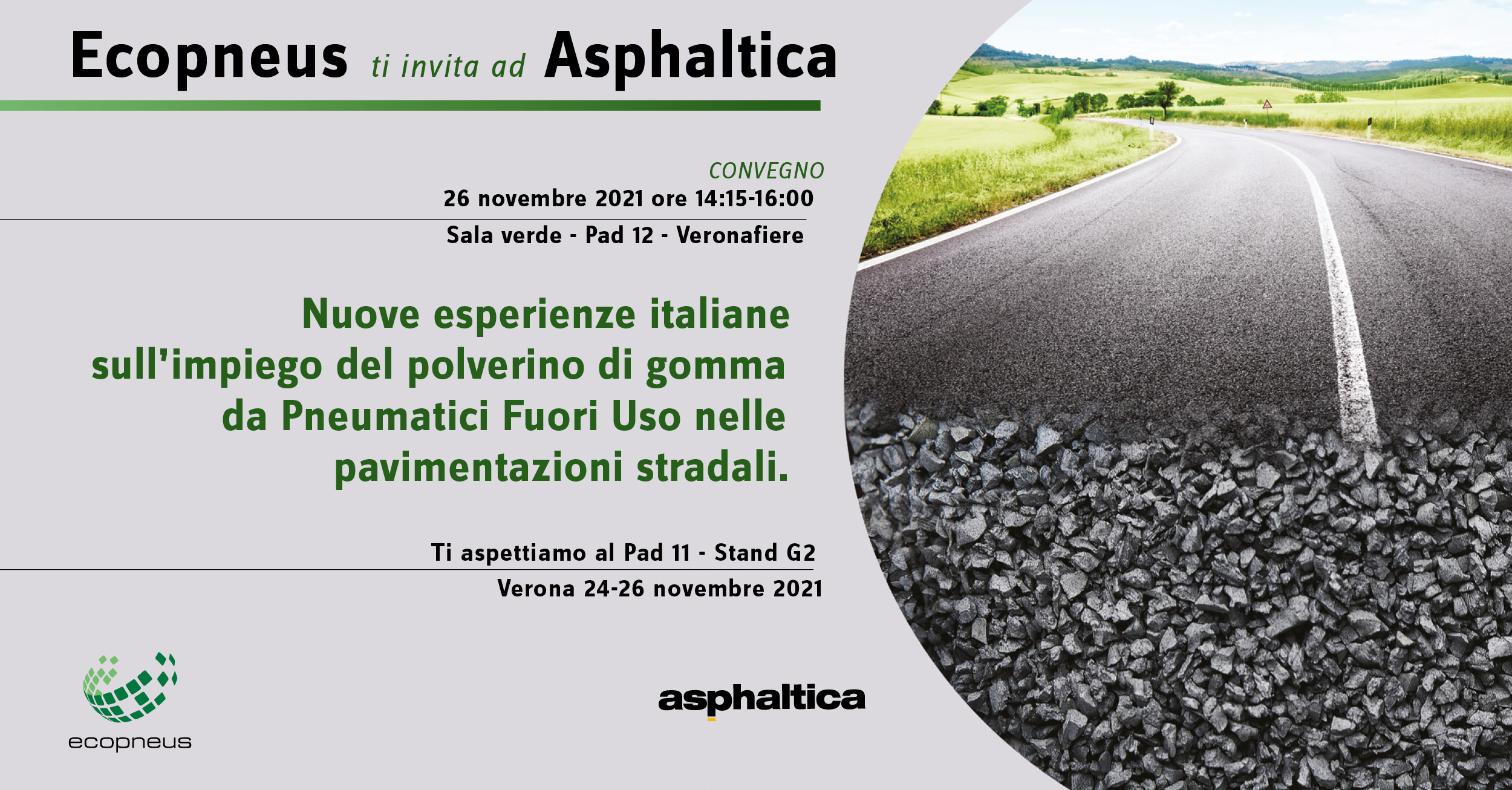We shall be talking about this topic at Asphaltica on 26th November. The use of asphalts modified with recycled rubber is growing in Italy as well as the development of new technologies that aim at further reducing the environmental impact of roads and improving their surface performances. As of today, over 630 km have already been surfaced with “rubberized” asphalts from the North to the South of our country.
The most valid innovative applications will be presented during the Ecopneus convention held at Verona’s Asphaltica trade fair on 26th November.
 Farewell potholes, cracks and road deformations. They are drivers’ and bikers’ n 1 enemy all over the Italian Peninsula. The merit goes to the new technologies asphalts are made with. In particular, those solutions that allow to noticeably improve their performances, such as the addition of rubber powder recycled from End-of-Life Tyres.
Farewell potholes, cracks and road deformations. They are drivers’ and bikers’ n 1 enemy all over the Italian Peninsula. The merit goes to the new technologies asphalts are made with. In particular, those solutions that allow to noticeably improve their performances, such as the addition of rubber powder recycled from End-of-Life Tyres.
Thanks to this multifunctional additive it is, indeed, possible to create roads that have excellent mechanical characteristics, i.e.: they resist the creation of cracks ad potholes in an excellent way. Moreover, they are also able to reduce the noise of the passing vehicles, thanks to an appropriate design. Indeed, the presence of rubber guarantees greater resistance to traffic stress and – in this way – both the noise and the mechanical performances last for longer. This is an important guarantee for those who are used to seeing “cheese-style” roads, permanently being resurfaced and that, in any case, crumble again as soon as they have been patched up.
A technological solution that combines scientific research, safety and environmental sustainability. In Italy, this technological solution is becoming of common use thanks to Ecopneus.
Ecopneus is the non-profit company that assures the collection and recycling of End-of-Life Tyres in Italy. For over 10 years, it has been committed to promoting the many possible applications of recycled rubber, with a constant view to a concrete circular economy.
Nowadays, in our Country, there exists a state-of-the-art asphalt chain that bets on research and development of innovative technologies in order to bring further benefits to the road sector. Indeed, the latter is under growing pressure to comply with requests of greater sustainability coming from the National and European objectives for the reduction of the environmental impact of infrastructures. Lower production and laying temperatures, the recycling of the old asphalt (that is removed) and the use of post-consumption recycled materials are the three main guidelines to make this sector more environmentally friendly.
Federico Dossena, General Manager of Ecopneus, stated: “Asphalts modified with recycled rubber are a state-of-the-art solution that offers concrete benefits: longer lasting, more silent roads without potholes. Less damage means also less maintenance and, as a consequence, lower management costs in the long run for the Public Administration and the Managing Bodies. Also ANAS has introduced rubberized asphalts in its specifications. This is a sign that makes us hope for a quick and widespread diffusion of rubberized asphalts throughout Italy”.
 The most recent Italian experiences in the use of rubber powder from End-of-Life Tyres for roads will be discussed also during a convention promoted by Ecopneus that will be held at Asphaltica on 26th November . Asphaltica is the infrastructure trade fair that will be held with the physical presence of both the public and exhibitors in Verona. Daniele Fornai of Ecopneus, Pietro Leandri of the University of Pisa, Maurizio Bocci of the Polytechnic University of the Marche Region, Davide Lo Presti of the University of Palermo and of the University of Nottingham, Edoardo Bocci of the E-Campus University and Massimiliano Bienati of the Sustainable Development Foundation will be talking about this valid technology.
The most recent Italian experiences in the use of rubber powder from End-of-Life Tyres for roads will be discussed also during a convention promoted by Ecopneus that will be held at Asphaltica on 26th November . Asphaltica is the infrastructure trade fair that will be held with the physical presence of both the public and exhibitors in Verona. Daniele Fornai of Ecopneus, Pietro Leandri of the University of Pisa, Maurizio Bocci of the Polytechnic University of the Marche Region, Davide Lo Presti of the University of Palermo and of the University of Nottingham, Edoardo Bocci of the E-Campus University and Massimiliano Bienati of the Sustainable Development Foundation will be talking about this valid technology.
At the Ecopneus stand, instead, a photographic and informative exhibition will accompany the visitor through the main technologies that are currently being used in Italy for the production of bituminous conglomerates modified with ELT-derived rubber: from the American Asphalt Rubber technology (Asphalt Rubber Italia), to the ECR engineered rubber powder developed by TRS Solutions-SMACOM; from the Itersilens multifunctional compound by Iterchimica and the RD-PRENE bitumen modifier developed by Tecnofilm to Drenoval Rubber – the low-noise emission conglomerate by Valli Zabban. Sustainability works its way forward.

 Collect ELT
Collect ELT